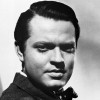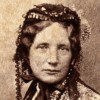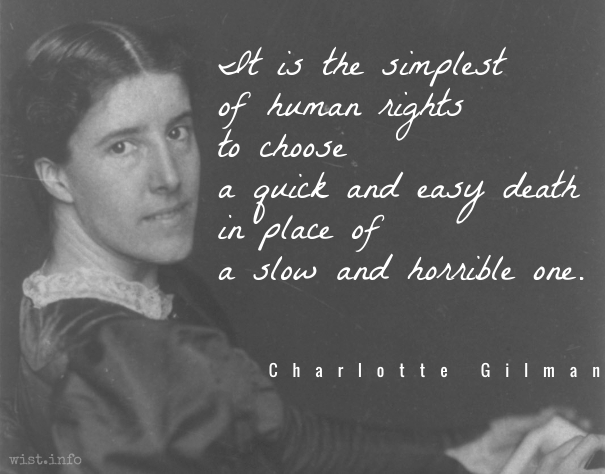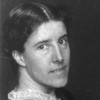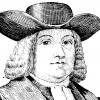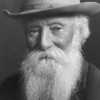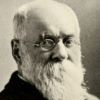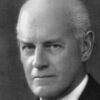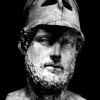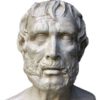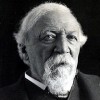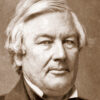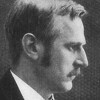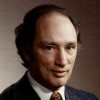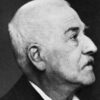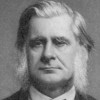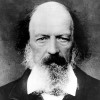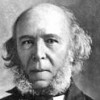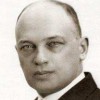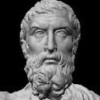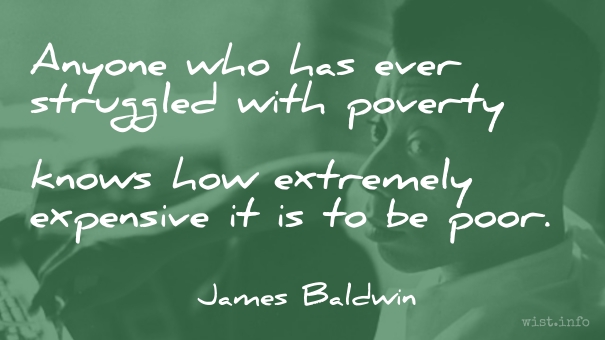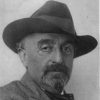The wit makes fun of other persons; the satirist makes fun of the world; the humorist makes fun of himself, but in so doing, he identifies himself with people — that is, people everywhere, not for the purpose of taking them apart, but simply revealing their true nature.
Ladies and gentlemen, I have a grave announcement to make. Incredible as it may seem, strange beings who landed in New Jersey tonight are the vanguard of an invading army from Mars.
The Bill of Rights was designed trustfully to prohibit forever two of the favorite crimes of all known governments: the seizure of private property without adequate compensation and the invasion of the citizen’s liberty without justifiable cause and due process.
Human life consists in mutual service. No grief, pain, misfortune, or “broken heart,” is excuse for cutting off one’s life while any power of service remains. But when all usefulness is over, when one is assured of an unavoidable and imminent death, it is the simplest of human rights to choose a quick and easy death in place of a slow and horrible one.
I regret that I am not clear as to what you intend by arisch. I am not of Aryan extraction: that is Indo-Iranian; as far as I am aware none of my ancestors spoke Hindustani, Persian, Gypsy, or any related dialects. But if I am to understand that you are enquiring whether I am of Jewish origin, I can only reply that I regret that I appear to have no ancestors of that gifted people. My great-great-grandfather came to England in the eighteenth century from Germany: the main part of my descent is therefore purely English, and I am an English subject — which should be sufficient. I have been accustomed, nonetheless, to regard my German name with pride, and continued to do so throughout the period of the late regrettable war, in which I served in the English army. I cannot, however, forbear to comment that if impertinent and irrelevant inquiries of this sort are to become the rule in matters of literature, then the time is not far distant when a German name will no longer be a source of pride.
J.R.R. Tolkien (1892-1973) English writer, fabulist, philologist, academic [John Ronald Reuel Tolkien]
Letter to Rütten & Loening Publishing (1938-07-25)
(Source)
In response to the inquiry by a German publishing house about his ancestry, prior to their releasing a German-language edition of The Hobbit. Tolkien drafted two letters to Stanley Unwin, his agent. Unwin forwarded the other one, which refused to answer the question at all.
The Hobbit did not appear in German until 1957.
To the excessively fearful the chief characteristic of power is its arbitrariness. Man had to gain enormously in confidence before he could conceive an all-powerful God who obeys his own laws.
Two deputies, one of whom is a radical, have more in common than two radicals, one of whom is a deputy.
[Il y a moins de différence entre deux députés dont l’un est révolutionnaire et l’autre ne l’est pas, qu’entre deux révolutionnaires, dont l’un est député et l’autre ne l’est pas.]
Robert de Jouvenel (1882–1924) French journalist
La République des Camarades, Part 1, ch. 1 (1914)
Virtue, then, is a state involving rational choice, consisting in a mean relative to us and determined by reason — the reason, that is, by reference to which the practically wise person would determine it. It is a mean between two vices, one of excess, the other of deficiency. It is a mean also in that some vices fall short of what is right in feelings and actions, and others exceed it, while virtue both attains and chooses the mean.
[ἔστιν ἄρα ἡ ἀρετὴ ἕξις προαιρετική, ἐν μεσότητι οὖσα τῇ πρὸς ἡμᾶς, ὡρισμένῃ λόγῳ καὶ ᾧ ἂν ὁ φρόνιμος ὁρίσειεν. μεσότης δὲ δύο κακιῶν, τῆς μὲν καθ᾽ ὑπερβολὴν τῆς δὲ κατ᾽ ἔλλειψιν: καὶ ἔτι τῷ τὰς μὲν ἐλλείπειν τὰς δ᾽ ὑπερβάλλειν τοῦ δέοντος ἔν τε τοῖς πάθεσι καὶ ἐν ταῖς πράξεσι, τὴν δ᾽ ἀρετὴν τὸ μέσον καὶ εὑρίσκειν καὶ αἱρεῖσθαι.]
Aristotle (384-322 BC) Greek philosopher
Nicomachean Ethics [Ἠθικὰ Νικομάχεια], Book 2, ch. 5 (2.6.15-16) / 1106b.35 (c. 325 BC) [tr. Crisp (2000)]
(Source)
(Source (Greek)). Alternate translations:Virtue then is “a state apt to exercise deliberate choice, being in the relative mean, determined by reason, and as the man of practical wisdom would determine.” It is a middle state between too faulty ones, in the way of excess on one side and of defect on the other: and it is so moreover, because the faulty states on one side fall short of, and those on the other exceed, what is right, both in the case of the feelings and the actions; but Virtue finds, and when found adopts, the mean.
[tr. Chase (1847)]Moral virtue, then, is a certain formed state, or habit of purpose, which conforms to the relative mean in action, and which is determined to that mean by reason, or as the prudent man would determine it. And it is the mean between two vices, one of which consists in excess, and the other in defect. So that vices sometimes fall short of what is right in our emotions and in our actions, and sometimes exceed it, while virtue fines the mean and chooses it.
[tr. Williams (1869)]Virtue then is a state of deliberate moral purpose consisting in a mean that is relative to ourselves, the mean being determined by reason, or as a prudent man would determine it. It is a mean state firstly as lying between two vices, the vice of excess on the one hand, and the vice of deficiency on the other, and secondly because, whereas vices either fall short of or go beyond what is proper in the emotions and actions, virtue not only discovers but embraces the mean.
[tr. Welldon (1892)]Virtue, then, is a habit or trained faculty of choice, the characteristic of which lies in moderation or observance of the mean relatively to the persons concerned, as determined by reason, i.e. by the reason by which the prudent man would determine it. And it is a moderation, firstly, inasmuch as it comes in the middle or mean between two vices, one on the side of excess, the other on the side of defect; and, secondly, inasmuch as, while these vices fall short of or exceed the due measure in feeling and in action, it finds and chooses the mean, middling, or moderate amount.
[tr. Peters (1893)]Virtue, then, is a state of character concerned with choice, lying in a mean, i.e. the mean relative to us, this being determined by a rational principle, and by that principle by which the man of practical wisdom would determine it. Now it is a mean between two vices, that which depends on excess and that which depends on defect; and again it is a mean because the vices respectively fall short of or exceed what is right in both passions and actions, while virtue both finds and chooses that which is intermediate.
[tr. Ross (1908)]Virtue then is a settled disposition of the mind determining the choice of actions and emotions, consisting essentially in the observance of the mean relative to us, this being determined by principle, that is, as the prudent man would determine it. And it is a mean state between two vices, one of excess and one of defect. Furthermore, it is a mean state in that whereas the vices either fall short of or exceed what is right in feelings and in actions, virtue ascertains and adopts the mean.
[tr. Rackham (1934)]Virtue, then, is a deliberately choosing state, which is in a medial condition in relation to us, one defined by a reason and the one by which a practically-wise person would define it. Also, it is a medial condition between two vices, one of excess and the other of deficiency. Further, it is also such a condition because some vices are deficient in relation to what the relevant feelings and actions should be and other are excessive, but virtue both finds the mean and chooses it.
[tr. Reeve (1948)][Ethical] virtue, then, is a habit, disposed toward action by deliberate choice, being at the mean relative to us, and defined by reason and as a prudent man would define it. It is a mean between two vices, one by excess and the other by deficiency; and while some of the vices exceed while the others are deficient in what is right in feelings and actions, virtue finds and chooses the mean.
[tr. Apostle (1975)]So virtue is a purposive disposition, lying in a mean that is relative to us and determined by a rational principle, and by that which a prudent man would use to determine it. It is a mean between two kinds of vice, one of excess and the other of deficiency; and also for this reason, that whereas these vices fall short of or exceed the right measure in both feelings and actions, virtue discovers the mean and chooses it.
[tr. Thomson/Tredennick (1976)]Virtue, therefore, is a characteristic marked by choice, residing in the mean relative to us, a characteristic defined by reason and as the prudent person would define it. Virtue is also a mean with respect to two vices, the one vice related to excess, the other to deficiency; and further, it is a mean because some vices fall short of and others exceed what should be the case in both passions and actions, whereas virtue discovers and chooses the middle term.
[tr. Bartlett/Collins (2011)]
We should judge a man much more surely from what he dreams than from what he thinks.
[On jugerait bien plus sûrement un homme d’après ce qu’il rêve que d’après ce qu’il pense.]
In whatsoever Condition thou art, still ask thyself, What would my blessed Savior have thought, said, and done in this Case.
Thomas Fuller (1654-1734) English physician, preacher, aphorist, writer
Introductio ad Prudentiam, Vol. 1, # 693 (1725)
(Source)
"What Would Jesus Do?"
Censorship is telling a man he can’t eat steak because a baby can’t chew it.
Mark Twain (1835-1910) American writer [pseud. of Samuel Clemens]
(Spurious)
Unsourced in Twain's writings. Likely derived from this Heinlein quotation.
A sound rule of historical evidences is that while assertions should be treated with critical doubt, admissions are likely to be reliable.
I’d hate to be in those [slum] conditions and I’ll tell you if I were in those conditions, you’d have more trouble than you have already because I’ve got enough spark left in me to lead a mighty good revolt.
We are, in truth, more than half what we are by imitation. The great point is, to choose good models and to study them with care.
Lord Chesterfield (1694-1773) English statesman, wit [Philip Dormer Stanhope]
Letter to his son, #214 (18 Jan 1750)
(Source)
Imitate what is good wheresoever thou findest it, though among Turks, Jews, Pagans, or even Papists. And abominate Evil, though in thy nearest Relation.
Thomas Fuller (1654-1734) English physician, preacher, aphorist, writer
Introductio ad Prudentiam, Vol. 1, # 780 (1725)
(Source)
Editing should be, especially in the case of old writers, a counseling rather than a collaborating task. The tendency of the writer-editor to collaborate is natural, but he should say to himself, “How can I help this writer to say it better in his own style?” and avoid “How can I show him how I would write it, if it were my piece?”
The French want no-one to be their superior. The English want inferiors. The Frenchman constantly raises his eyes above him with anxiety. The Englishman lowers his beneath him with satisfaction.
Society in every state is a blessing, but Government, even in its best state, is but a necessary evil; in its worst state an intolerable one: for when we suffer, or are exposed to the same miseries by a Government, which we might expect in a country without Government, our calamity is heightened by reflecting that we furnish the means by which we suffer.
Thomas Paine (1737-1809) American political philosopher and writer
Common Sense, “On the Origin and Design of Government in General” (14 Feb 1776)
(Source)
Support your party, if you have one, but do not think all the good men are in it, and all the bad ones outside it.
Charles A. Dana (1819-1897) American journalist, publisher, author, government official
Code of Rules for New York Sun journalists, #7
Full text.
I honestly beleave it iz better tew know nothing than two know what ain’t so.
[I honestly believe it is better to know nothing than to know what ain’t so.]
Josh Billings (1818-1885) American humorist, aphorist [pseud. of Henry Wheeler Shaw]
Everybody’s Friend, Or; Josh Billing’s Encyclopedia and Proverbial Philosophy of Wit and Humor, “Sollum Thoughts” (1874)
(Source)
This was Billings signature aphorism, and he used variations on multiple occasions. Variants and evolutions have also been misattributed to Will Rogers, Mark Twain, and Artemus Ward, sometimes from their own paraphrases of Billings. Some variations (usually without specific citations) include:In a similar vein, Billings wrote, "Wisdum don't konsist in knowing more that iz new, but in knowing less that iz false. [Wisdom doesn't consist in knowing more that is new, but in knowing less than is false.]" [Source]
- "The trouble with people is not that they don't know but that they know so much that ain't so."
- "It ain't what you don't know that gets you into trouble. It's what you know for sure that just ain't so."
- "You’d better not know so much, than know so many things that ain’t so."
More discussion about this quotation:
- It Ain’t What You Don’t Know That Gets You Into Trouble. It’s What You Know for Sure That Just Ain’t So – Quote Investigator
- Ralph Keyes, The Quote Verifier (2006)
- Ralph Keyes, Nice Guys Finish Seventh (1992)
- James Billington, Respectfully Yours (1993)
- Daniel Levitin, A Field Guide to Lies, Deluxe Ed. (2016)
Far over the misty mountains cold
To dungeons deep and caverns old
We must away ere break of day
To seek the pale enchanted gold.The dwarves of yore made mighty spells,
While hammers fell like ringing bells
In places deep, where dark things sleep,
In hollow halls beneath the fells.For ancient king and elvish lord
There many a gleaming golden hoard
They shaped and wrought, and light they caught
To hide in gems on hilt of sword.On silver necklaces they strung
The flowering stars, on crowns they hung
The dragon-fire, in twisted wire
They meshed the light of moon and sun.Far over the misty mountains cold
To dungeons deep and caverns old
We must away, ere break of day,
To claim our long-forgotten gold.Goblets they carved there for themselves
And harps of gold; where no man delves
There lay they long, and many a song
Was sung unheard by men or elves.The pines were roaring on the height,
The winds were moaning in the night.
The fire was red, it flaming spread;
The trees like torches blazed with light.The bells were ringing in the dale
And men they looked up with faces pale;
The dragon’s ire more fierce than fire
Laid low their towers and houses frail.The mountain smoked beneath the moon;
The dwarves they heard the tramp of doom.
They fled their hall to dying fall
Beneath his feet, beneath the moon.Far over the misty mountains grim
To dungeons deep and caverns dim
We must away, ere break of day,
To win our harps and gold from him!J.R.R. Tolkien (1892-1973) English writer, fabulist, philologist, academic [John Ronald Reuel Tolkien]
The Hobbit, ch. 1 “An Unexpected Party” [Thorin, et al.] (1937)
(Source)
Song sung by Thorin Oakenshield and the rest of his dwarvish company.
We take for granted the need to escape the self. Yet the self can also be a refuge. In totalitarian countries the great hunger is for private life. Absorption in the minutiae of an individual existence is the only refuge from the apocalyptic madhouse staged by maniacal saviors of humanity.
Persuasion is better than force.
The story of each stone leads back to a mountain.
W. S. Merwin (1927-2019) American poet [William Stanley Merwin]
Houses and Travellers (1977)
Virtues, however, we acquire by first exercising them. The same is true with skills, since what we need to learn before doing, we learn by doing; for example, we become builders by building, and lyre-players by playing the lyre. So too we become just by doing just actions, temperate by temperate actions, and courageous by courageous actions.
[τὰς δ’ ἀρετὰς λαμβάνομεν ἐνεργήσαντες πρότερον, ὥσπερ καὶ ἐπὶ τῶν ἄλλων τεχνῶν· ἃ γὰρ δεῖ μαθόντας ποιεῖν, ταῦτα ποιοῦντες μανθάνομεν, οἷον οἰκοδομοῦντες οἰκοδόμοι γίνονται καὶ κιθαρίζοντες κιθαρισταί· οὕτω δὴ καὶ τὰ μὲν δίκαια πράττοντες δίκαιοι γινόμεθα, τὰ δὲ σώφρονα σώφρονες, τὰ δ’ ἀνδρεῖα ἀνδρεῖοι.]
Aristotle (384-322 BC) Greek philosopher
Nicomachean Ethics [Ἠθικὰ Νικομάχεια], Book 2, ch. 1 (2.1, 1103a.32ff) (c. 325 BC) [tr. Crisp (2000)]
(Source)
(Source (Greek)). Alternate translations:But the Virtues we get by first performing single acts of working, which, again, is the case of other things, as the arts for instance; for what we have to make when we have learned how, these we learn how to make by making: men come to be builders, for instance, by building; harp-players, by playing on the harp: exactly so, by doing just actions we come to be just; by doing the actions of self-mastery we come to be perfected in self-mastery; and by doing brave actions brave.
[tr. Chase (1847)]But the virtues we acquire by previous practice of their acts, exactly as we acquire our knowledge of the various arts. For, in the case of the arts, that which we have to be taught to do, that we learn by doing it. We become masons, for instance, by building; and harpers b y playing upon the harp. And so, in like manner, we become just by doing what is just, temperate by doing what is temperate, and brave by doing what is brave.
[tr. Williams (1869), sec. 23]But the virtues we acquire by first exercising them, as is the case with all the arts, for it is by doing what we ought to do when we have learnt the arts that we learn the arts themselves; we become e.g. builders by building and harpists by playing the harp. Similarly it is by doing just acts that we become just, by doing temperate acts that we become temperate, by doing courageous acts that we become courageous.
[tr. Welldon (1892)]But the virtues we acquire by doing the acts, as is the case with the arts too. We learn an art by doing that which we wish to do when we have learned it; we become builders by building, and harpers by harping. And so by doing just acts we become just, and by doing acts of temperance and courage we become temperate and courageous.
[tr. Peters (1893)]But the virtues we get by first exercising them, as also happens in the case of the arts as well. For the things we have to learn before we can do them, we learn by doing them, e.g. men become builders by building and lyreplayers by playing the lyre; so too we become just by doing just acts, temperate by doing temperate acts, brave by doing brave acts.
[tr. Ross (1908)]The virtues on the other hand we acquire by first having actually practised them, just as we do the arts. We learn an art or craft by doing the things that we shall have to do when we have learnt it: for instance, men become builders by building houses, harpers by playing on the harp. Similarly we become just by doing just acts, temperate by doing temperate acts, brave by doing brave acts.
[tr. Rackham (1934), ch. 1, sec. 4]The virtues, by contrast, we acquire by first engaging in the activities, as is also true in the case of the various crafts. For the things we cannot produce without learning to do so are the very ones we learn to produce by producing them -- for example, we become builders by building houses and lyre players by playing the lyre. Similarly, then, we become just people by doing just actions, temperate people by doing temperate actions, and courageous people by doing courageous ones.
[tr. Reeve (1948)]In the case of the virtues, on the other hand, we acquire them as a result of prior activities; and this is like the case of the arts, for that which we are to perform by art after learning, we first learn by performing, e.g., we become builders by building and lyre-players by playing the lyre. Similarly, we become just by doing what is just, temperate by doing what is temperate, and brave by doing brave deeds.
[tr. Apostle (1975)]Virtues, by contrast, we acquire, just as we acquire crafts, by having previously activated them. For we learn a craft by producing the same product that we must produce when we have learned it, becoming builders, for instance, by building and harpists by playing the harp, so also, then, we become just by doing just actions, temperate by doing temperate actions, brave by doing brave actions.
[tr. Irwin/Fine (1995)]For as regards those things we must learn how to do, we learn by doing them -- for example by building houses, people become house builders, and by playing the cithara, they become cithara players. So too, then, by doing just things become just; moderate things, moderate; and courageous things, courageous.
[tr. Bartlett/Collins (2011)]We develop virtues after we have practiced them beforehand, the same way it works with the other arts. For, we learn as we do those very things we need to do once we have learned the art completely. So, for example, men become carpenters by building homes and lyre-players by practicing the lyre. In the same way, we become just by doing just things, prudent by practicing wisdom, and brave by committing brave deeds.
[tr. @sentantiq (2017)]
This brother, who is little remembered, was a complacent miser who, being a priest, felt obliged to give alms to the poor he encountered, though he never gave them anything but worthless Revolutionary coins or demonetized sous, thereby contriving to go to hell by following the path to paradise.
[Ce frère, dont il est resté peu de souvenir, était un paisible avare, qui, étant prêtre, se croyait obligé de faire l’aumône aux pauvres qu’il rencontrait, mais il ne leur donnait jamais que des monnerons ou des sous démonétisés, trouvant ainsi moyen d’aller en enfer par le chemin du paradis.]Victor Hugo (1802-1885) French writer
Les Misérables, Part 3 “Marius,” Book 2 “The Grand Bourgeois,” ch. 6 (3.2.6) (1862) [tr. Donougher (2013)]
(Source)
(Source (French)). Alternate translations:This brother, of whom hardly a memory is left, was a quiet miser, who, being a priest, felt obliged to give alms to the poor whom he met, but never gave them anything more than coppers or worn-out sous, finding thus the means of going to Hell by the road to Paradise.
[tr. Wilbour (1862); tr. Wilbour / Fahnestock / MacAfee (1987)]This brother, who is not much remembered, was a great miser, who, as he was a priest, thought himself bound to give alms to the poor he met, but he never gave them aught but bad or called-in money, thus finding means of going to Hades by the road to Paradise.
[tr. Wraxall (1862)]This brother, of whom but little memory remains, was a peaceable miser, who, being a priest, thought himself bound to bestow alms on the poor whom he met, but he never gave them anything except bad or demonetized sous, thereby discovering a means of going to hell by way of paradise.
[tr. Hapgood (1887)]The brother, whom he scarcely remembered, had been a peaceable skinflint who, being a priest, felt it his duty to give alms to such of the poor as he encountered; but the coins he gave them were always obsolete currency, and thus he found means of going to Hell by way of Paradise.
[tr. Denny (1976)]
Fight for your opinions, but do not believe that they contain the whole truth, or the only truth.
Charles A. Dana (1819-1897) American journalist, publisher, author, government official
Code of Rules for New York Sun journalists, #6
Full text.
The vital influences are to be detected, not in the formal documents compiled by rulers, ministers and generals, but in their marginal notes and verbal asides.
Perhaps the whole root of our trouble, the human trouble, is that we will sacrifice all the beauty of our lives, will imprison ourselves in totems, taboos, crosses, blood sacrifices, steeples, mosques, races, armies, flags, nations, in order to deny the fact of death, which is the only fact we have.
When you’re not looking at it, this sentence is in Spanish.
Douglas R. Hofstadter (b. 1945) American academic, cognitive scientist, author
“Understanding understanding,” Scientific American (Jan 1981)
(Source)Frequently misattributed to his most famous book, Gödel, Escher, Bach: An Eternal Golden Braid (1979). Reprinted in his <i>Metamagical Themas</i>, ch. 1 "On Self-Referential Sentences" (1985).
From now on, I think it is safe to predict, neither the Democratic nor the Republican Party will ever nominate for President a candidate without good looks, stage presence, theatrical delivery, and a sense of timing.
The best laws cannot make a constitution work in spite of morals; morals can turn the worst laws to advantage. That is a commonplace truth, but one to which my studies are always bringing me back. It is the central point in my conception. I see it at the end of all my reflections.
[Les meilleures lois ne peuvent faire marcher une constitution en dépit des mœurs ; les mœurs tirent parti des pires lois. C’est là une vérité commune, mais à laquelle mes études me ramènent sans cesse. Elle est placée dans mon esprit comme un point central. Je l’aperçois au bout de toutes mes idées.]
We all lose in the end, that is the intention.
Emanuel Lasker (1868-1941) German chess player, mathematician
(Attributed)
Our strategy is one of preventing war by making it self-evident to our enemies that they’re going to get their clocks cleaned if they start one.
John W. Vessey, Jr. (1922-2016) American career US Army officer
Speech to soldiers, Schofield Barracks, Hawaii (14 Jul 1984)
The necessity of establishing some form of government [is] to supply the defect of moral virtue.
Thomas Paine (1737-1809) American political philosopher and writer
Common Sense, “On the Origin and Design of Government in General” (14 Feb 1776)
Full text.
A man who drinks too much on occasion is still the same man as he was sober. An alcoholic, a real alcoholic, is not the same man at all. You can’t predict anything about him for sure except that he will be someone you never met before.
What can any individual do? Of that, every individual can judge. There is one thing that every individual can do, — they can see to it that they feel right. An atmosphere of sympathetic influence encircles every human being; and the man or woman who feels strongly, healthily and justly, on the great interests of humanity, is a constant benefactor to the human race. See, then, to your sympathies in this matter! Are they in harmony with the sympathies of Christ? or are they swayed and perverted by the sophistries of worldly policy?
How a minority,
Reaching majority,
Seizing authority,
Hates a minority!Leonard Harman Robbins (1877–1947) American writer
“Minorities”
Fantasy remains a human right: we make in our measure and in our derivative mode, because we are made: and not only made, but made in the image and likeness of a Maker.
J.R.R. Tolkien (1892-1973) English writer, fabulist, philologist, academic [John Ronald Reuel Tolkien]
“On Fairy-Stories” (1939, rev 1947)
(Source)
I am tolerant of all creeds. Yet if any sect suffered itself to be used for political objects I would meet it by political opposition. In my view church and state should be separate, not only in form, but fact. Religion and politics should not be mingled.
She just wore
Enough for modesty—no more.Robert Williams Buchanan (1841–1901) Scottish writer
“White Rose and Red,” Part 1, sec. 5, l. 60 (1873)
Therefore it is fitting for the women to be married at about the age of eighteen and the men at thirty-seven or a little before — for that will give long enough for the union to take place with their bodily vigor at its prime, and for it to arrive with a convenient coincidence of dates at the time when procreation ceases. Moreover the succession of the children to the estates, if their birth duly occurs soon after the parents marry, will take place when they are beginning their prime, and when the parents’ period of vigor has now come to a close, towards the age of seventy.
Aristotle (384-322 BC) Greek philosopher
Politics [Πολιτικά], Book 7, ch. 16 / 1335a.27 [tr. Rackham (1932)]
(Source)
Alt. trans.:And so it is best to unite women of about eighteen years of age and men of thirty-seven or less; for by such an arrangement the union will be during their greatest physical perfection, and will, as the years pass reach the limit of child-begetting at the right time. Again, the succession of children will be secured, as the younger generation will be having children at the beginning of their prime, supposing some to be born at once, as we may expect, and as the right age has passed away from the older generation as they approach the limit of seventy years.
[tr. Bolland (1877)]Women should marry when they are about eighteen years of age, and men at seven and thirty; then they are in the prime of life, and the decline in the powers of both will coincide. Further, the children, if their birth takes place soon, as may reasonably be expected, will succeed in the beginning of their prime, when the fathers are already in the decline of life, and have nearly reached their term of three-score years and ten.
[tr. Jowett (1885)]For which reason the proper time for a woman to marry is eighteen, for a man thirty-seven, a little more or less; for when they marry at that time their bodies are in perfection, and they will also cease to have children at a proper time; and moreover with respect to the succession of the children, if they have them at the time which may reasonably be expected, they will be just arriving into perfection when their parents are sinking down under the load of seventy years.
[tr. Ellis (1912)]Hence it is fitting for women to unite in marriage around the age of eighteen, and for men at thirty-seven or a little before. At such an age, union will occur when their bodies are in their prime, and will arrive at its conclusion conveniently for both of them with respect to the cessation of procreation. Further, the succession of the offspring -- if birth occurs shortly after marriage, as can reasonably be expected -- will be for them at the beginning of their prime, while for the fathers it will be when their age has already run its course toward the seventieth year.
[tr. Lord (1984)]
Upon the first goblet he read this inscription, monkey wine; upon the second, lion wine; upon the third, sheep wine; upon the fourth, swine wine. These four inscriptions expressed the four descending degrees of drunkenness: the first, that which enlivens; the second, that which irritates; the third, that which stupefies; finally the last, that which brutalizes.
[Sur le premier gobelet on lisait cette inscription: vin de singe, sur le deuxième: vin de lion, sur le troisième: vin de mouton, sur le quatrième: vin de cochon. Ces quatre légendes exprimaient les quatre degrés que descend l’ivrogne; la première ivresse, celle qui égaye; la deuxième, celle qui irrite; la troisième, celle qui hébète; la dernière enfin, celle qui abrutit.]Victor Hugo (1802-1885) French writer
Les Misérables, Part 2 “Cosette,” Book 6 “Petite Picpus,” ch. 9 (2.6.9) (1862) [tr. Wilbour (1862)]
(Source)
An anecdote told by a century-old nun about filled wine goblets customarily presented, before the Revolution, by city fathers to important personages who passed through in Burgandy or Champagne.
(Source (French)). Alternate translations:On the the first cup was the inscription “ape-wine,” on the second, “lion-wine,” on the third, “sheep-wine,” and on the fourth, “hog-wine.” These four mottoes expressed the four stages of intoxication—the first that enlightens, the second that irritates, the third that dulls, and the fourth that brutalizes.
[tr. Wraxall (1862)]On the first goblet this inscription could be read, monkey wine; on the second, lion wine; on the third, sheep wine; on the fourth, hog wine. These four legends express the four stages descended by the drunkard; the first, intoxication, which enlivens; the second, that which irritates; the third, that which dulls; and the fourth, that which brutalizes.
[tr. Hapgood (1887)][...] four goblets, each of which bore a different wine and bore a different inscription -- vin de singe, vin de lion, vin de mouton, and vin de cochon.. They represented the four stages of intoxication -- gaiety, quarrelsomeness, dull-wittedness, and finally stupor.
[tr. Denny (1976)]On the first goblet he read the inscription "monkey wine," on the second "lion wine," on the third "sheep wine," on the fourth "swine wine." These four inscriptions expressed the four descending degrees of drunkenness: the first, which enlivens; the second, which irritates; the third, which stupefies; finally the last, which brutalizes.
[tr. Wilbour/Fahnestock/MacAfee (1987)]On the first goblet an inscription read: 'monkey's wine'; on the second, 'lion's wine'; on the third, 'sheep's wine'; on the fourth, 'hog's wine'. These four legends expressed the four stages of intoxication through which the drunkard descends: the first, of merriment; the second, of ill temper; the third, of dullness; and the fourth, of brutishness.
[tr. Donougher (2013)]
We take the position that there is no place for the state in the bedrooms of the nation.
[L’État n’a pas d’affaires dans les chambres à coucher de la nation.]
Pierre Trudeau (1919–2000) Canadian politician
Comment in Canadian House of Commons (22 Dec 1967)On the decriminalization of homosexuality. Also reported in a remark to newsmen in Ottawa as "The state has no business in the bedrooms of the nation" in The Globe and Mail (22 Dec 1967). Paraphrasing an earlier editorial in The Globe and Mail (12 Dec 1967): "Obviously, the state's responsibility should be to legislate rules for a well-ordered society. It has no right or duty to creep into the bedrooms of the nation."
I cannot say that I am in the slightest degree impressed by your bigness, or your material resources, as such. Size is not grandeur, and territory does not make a nation. The great issue, about which hangs true sublimity, and the terror of overhanging fate, is what are you going to do with all these things?
Bureaucrats write memoranda both because they appear to be busy when they are writing and because the memos, once written, immediately become proof that they were busy.
Charles Peters (b. 1926) American journalist, editor, author
How Washington Really Works (1980)
Man has gone long enough, or even too long, without being man enough to face the simple truth that the trouble with Man is Man.
James Thurber (1894-1961) American cartoonist and writer
“The Trouble with Man is Man,” The New Yorker (27 Aug 1960)
Full text.
It is a Secret known but to a few, yet of no small use in the Conduct of Life, that when you fall into a Man’s Conversation, the first thing you should consider is, whether he has a greater Inclination to hear you, or that you should hear him.
I … hate with a murderous hatred those men who, having lived their youth, would send into war other youth, not lived, unfulfilled, to fight and die for them; the pride and cowardice of those old men, making their wars that boys must die.
Mary Roberts Rinehart (1876–1958) American novelist
My Story, ch. 36 (1931)
In the long run, however little you talk or even think about it, the most durable thing in writing is style, and style is the most valuable investment a writer can make with his time. It pays off slowly, your agent will sneer at it, your publisher will misunderstand it, and it will take people you never heard of to convince them by slow degrees that the writer who puts his individual mark on the way he writes will always pay off.
Facts too shocking to be contemplated occasionally force their way to the public ear, and the comment that one often hears made on them is more shocking than the thing itself. It is said, “Very likely such cases may now and then occur, but they are no sample of general practice.” If the laws of New England were so arranged that a master could now and then torture an apprentice to death, would it be received with equal composure? Would it be said, “These cases are rare, and no samples of general practice”? This injustice is an inherent one in the slave system, — it cannot exist without it.
As one digs deeper into the national character of the Americans, one sees that they have sought the value of everything in this world only in the answer to this single question: how much money will it bring in?
People often grudge others when they cannot enjoy themselves.
Aesop (620?-560? BC) Legendary Greek storyteller
Fables [Aesopica], “The Dog in the Manger” (6th C BC)
(Source)
Be not too hasty to trust or to admire the teachers of morality; they discourse like angels, but they love like men.
Samuel Johnson (1709-1784) English writer, lexicographer, critic
The History of Rasselas, Prince of Abissinia, ch. 18 (1759)
(Source)
The weight of evidence for an extraordinary claim must be proportioned to its strangeness.
Pierre-Simon, Marquis de Laplace (1749-1827) French mathematician, astronomer
“The Principle of Laplace” (Attributed)
See also Carl Sagan.
The image is made to order, tailored to us. An ideal, on the other hand, has a claim on us. It does not serve us; we serve it. If we have trouble striving toward it, we assume the matter is with us, and not with the ideal.
For as man is the best of the animals when perfected, so he is the worst of all when sundered from law and justice. For unrighteousness is most pernicious when possessed of weapons, and man is born possessing weapons for the use of wisdom and virtue, which it is possible to employ entirely for the opposite ends. Hence when devoid of virtue man is the most unholy and savage of animals, and the worst in regard to sexual indulgence and gluttony.
Aristotle (384-322 BC) Greek philosopher
Politics [Πολιτικά], Book 1, ch. 2 / 1253a.31 [tr. Rackham (1932)]
(Source)
Alternate translations:
For man is an animal which, just as it is when fully perfected the best of all, so when separated from law and justice, is the worst of all. For injustice is most difficult to cope with when armed. Man is born into the world in the possession of arms, in the shape of practical wisdom and moral excellence, which he can use to the fullest degree for exactly contrary objects; when destitute of virtue, he is an animal most unholy and most savage, and most viciously disposed toward sensuality and gluttony.
[tr. Bolland (1877)]For man, when perfected, is the best of animals, but, when separated from law and justice, he is the worst of all; since armed injustice is the more dangerous, and he is equipped at birth with arms, meant to be used by intelligence and virtue, which he may use for the worst ends. Wherefore, if he have not virtue, he is the most unholy and the most savage of animals, and the most full of lust and gluttony.
[tr. Jowett (1885)]For as by the completion of it man is the most excellent of all living beings, so without law and justice he would be the worst of all, for nothing is so difficult to subdue as injustice in arms: but these arms man is born with, namely, prudence and valour, which he may apply to the most opposite purposes, for he who abuses them will be the most wicked, the most cruel, the most lustful, and most gluttonous being imaginable.
[tr. Ellis (1912)]For just as man is the best of animals when completed, when separated from law and adjudication he is the worst of all. For injustice is harshest when it is furnished with arms, and man is born naturally possessing arms for prudence and virtue which nevertheless are very susceptible to being used for their opposites. That is why, without virtue, he is the most unholy and the most savage of animals, and the worst with regard to sex and food.
[tr. Lord (1984)]
Music expresses that which cannot be said and on which it is impossible to be silent.
[Ce qu’on ne peut dire et ce qu’on ne peut taire, la musique l’exprime.]
Victor Hugo (1802-1885) French writer
William Shakespeare, Part 1, Book 2, ch. 4 (1864) [tr. Baillot]
(Source)
(Source (French)). Alternate translation:Music expresses that which cannot be said, and which cannot be suppressed.
[tr. Anderson (1891)]
I tell you … as officers, that you will neither eat, nor drink, nor smoke, nor sit down, nor lean against a tree until you have personally seen that your men have first had a chance to do these things. If you will do this for them, they will follow you to the ends of the earth. And if you do not, I will bust you in front of your regiments.
Anyone who has ever struggled with poverty knows how extremely expensive it is to be poor.
James Baldwin (1924-1987) American novelist, playwright, activist
“Fifth Avenue, Uptown: a Letter from Harlem,” Esquire (Jul 1960)
(Source)
The vast number of titles which are published each year — all of them are to the good, even if some of them may annoy or even repel us for a time. For none of us would trade freedom of expression and of ideas for the narrowness of the public censor. America is a free market for people who have something to say, and need not fear to say it.
All sides in a trial want to hide at least some of the truth.
The defendant wants to hide the truth because he’s generally guilty. The defense attorney’s job is to make sure the jury does not arrive at that truth.
The prosecution … wants to make sure the process by which the evidence was obtained is not truthfully presented, because, as often as not, that process will raise questions.
The judge also has a truth he wants to hide: He often hasn’t been completely candid in describing the facts or the law.
Throughout history it has been the inaction of those who could have acted, the indifference of those who should have known better, the silence of the voice of justice when it mattered most, that has made it possible for evil to triumph.
Haile Selassie I (1892-1975) Emperor of Ethiopia (1930-1974) [b. Tafari Makonnen]
Address, UN General Assembly, Addis Ababa (4 Oct 1963)Opening address to a special session of the General Assembly, making him the first ruler to address both the League of Nations and the United Nations.
See E. Burke.
Once upon a sunny morning a man who sat in a breakfast nook looked up from his scrambled eggs to see a white unicorn with a golden horn quietly cropping the roses in the garden. The man went up to the bedroom where his wife was still asleep and woke her. “There’s a unicorn in the garden,” he said. “Eating roses.” She opened one unfriendly eye and looked at him. “The unicorn is a mythical beast,” she said, and turned her back on him. The man walked slowly downstairs and out into the garden. The unicorn was still there; he was now browsing among the tulips.
James Thurber (1894-1961) American cartoonist and writer
“The Unicorn in the Garden”, The New Yorker (31 Oct 1939)
Full text.




